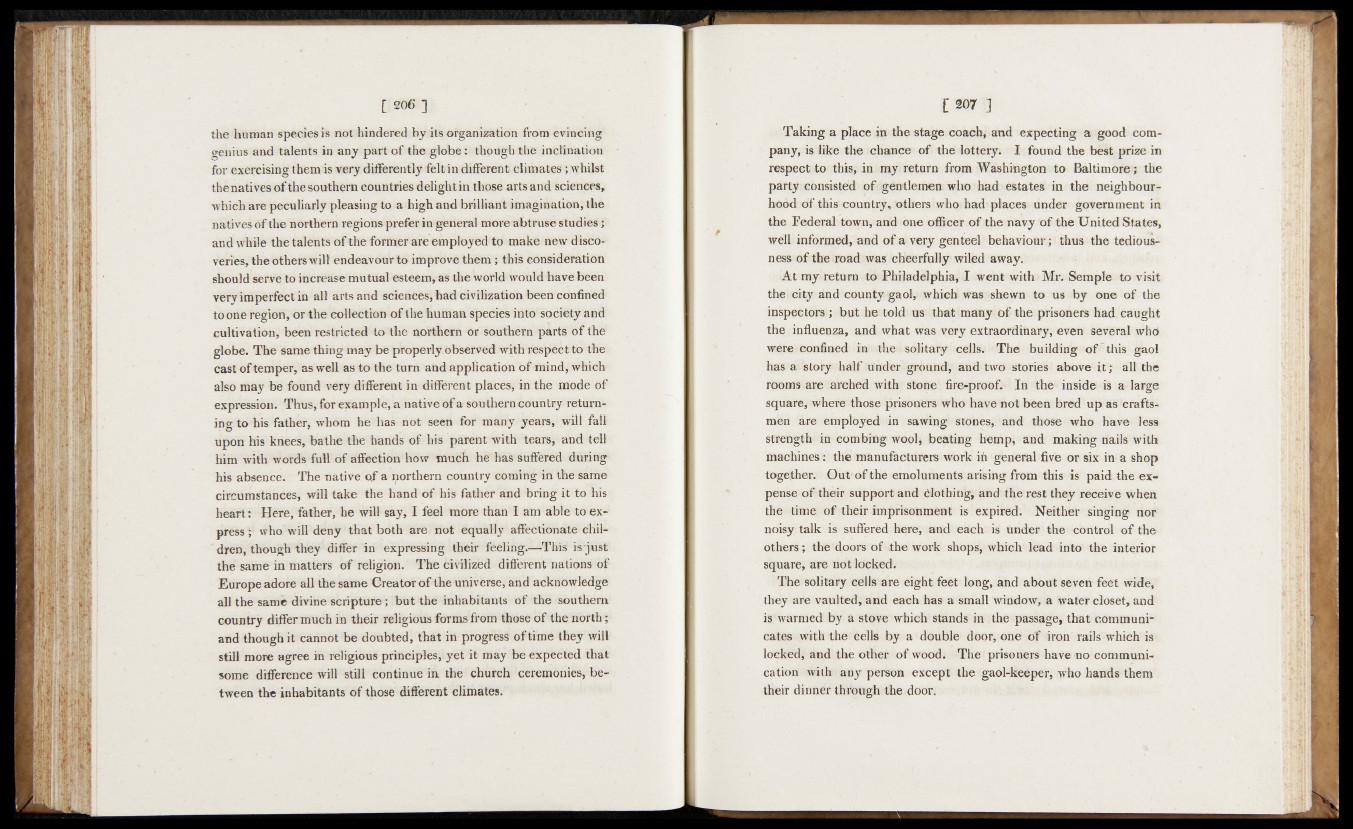
the human species is not hindered by its organization from evincing
genius and talents in any part of the globe : though the inclination
for exercising them is very differently felt in different climates; whilst
thenatives of the southern countries delight in those arts and sciences,
which are peculiarly pleasing to a high and brilliant imagination, the
natives of the northern regions prefer in general more abtruse studies;
and while the talents of the former are employed to make new discoveries,
the others will endeavour to improve them; this consideration
should serve to increase mutual esteem, as the world would have been
very imperfect in all arts and sciences, had civilization been confined
toone region, or the collection of the human species into soeiety and
cultivation, been restricted to'the northern or southern parts of the
globe. The same thing may be properly observed with respect to the
cast of temper, as well as to the turn and application of mind, which
also may be found very different in different places, in the mode of
expression. Thus, for example, a native of a southern country returning
to his father, whom he has not seen for many years, will fall
upon his knees, bathe the hands of his parent with tears, and tell
him with words full of affection how much he has suffered dming-
his absence. The native of a northern country coming in the same
circumstanees, will take the hand of his father and bring it-to his
heart: Here, father, he will say, I feel more than I am able to ex-;
press; who will deny that both are not equally affectionate chib
dren, though they differ in expressing their feeling.—This is-just
the same in matters of religion. The civilized different nations of
Europe adore all the same Creator of the universe, and acknowledge
all the same divine scripture; but the inhabitants of the southern
country differmuch in their religious forms from those of the north;
and though it cannot be doubted, that in progress of time they will
still more agree in religious principles, yet it may be expected that
some difference will still continue in the church ceremonies, between
the inhabitants of those different climates.
Taking a place in the stage coach, and expecting a good company,
is like the chance of the lottery. 1 found the best prize in
respect to this, in 1 myi return from Washington to Baltimore ; the
party'consisted of-gentlemen who had estates in the neighbourhood
of this country, others who had places under government in
the Federal town, and one officer of the navy of the United States,
well informed, and of a very genteel behaviour ; thus the tediousness
of the road was cheerfully wiled away.
At my return to Philadelphia, I went with*Mr. Semple to visit
the city and county«gaoly which was shewn to us by one of the
inspectors ; but he told us that many of the prisoners had caught
thq influenza, and what was very extraordinary, even several whd
were confined iw theHS<#tat*y;ic^i^.**' The building of this gaol
has à* story half under ground, and two stories above it ; all the
rooms are arched with stone' fire-proof. In the - inside is a large
square, where those prisoners who have not been bred up as craftsmen
are employed in sawing stones, and those who have less
strength in combing WööV beating hemp, and making nails with
machines: the manufacturers work ih general five or six in a shop
together. Gut’ of the emoluments arising from this is paid the expense
of their support and Clothing, and the rest they receive when
the time of their imprisonment is expired. Neither singing nor
noisy talk is suffered here, and each is tinder the control of the
others; the doors of Ahe work shops, which lead into the interior
square, are not locked.
The solitary ceils are eight feet long, and about seven feet wide,
they are vaulted, and each has a small window, a water closet, and
is warmed by a stove which stands in the passage, that communicates
with the cells by a double door, one of iron rails which is
locked, and the other of wood; The prisoners have no‘communication
with any person except the gaol-feeéper, who hands them
their dinner through the door.